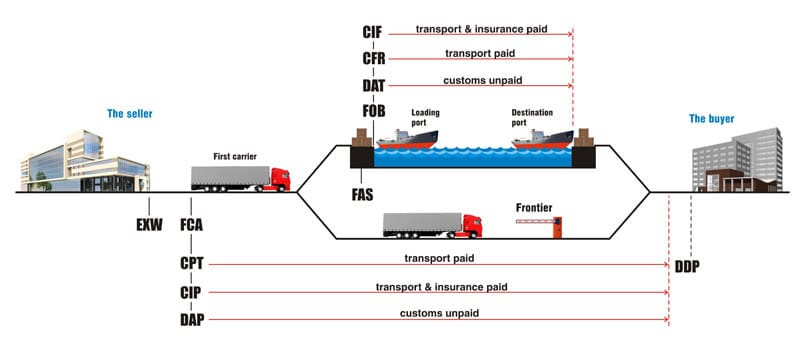Incoterms (International Commercial Terms)
Latest Applications Open 2024:
The international chamber of commerce first published in 1936 a set of international rules for the interpretation of trade terms.
These rules were known as Incoterms 1936. Amendments and additions were later made in 1953, 1967, 1990, and 2000 to bring the standards in line with current international trade practices.
The following are the Incoterms
1) EXW – ExWorks (2000 and 2010)
This term represents the seller’s minimum obligation since he only has to place the goods at the disposal of the buyer. The buyer must carry out all tasks of export & import clearance. Carriage & insurance is to be arranged by the buyer.
2) FCA – Free Carrier (2000 and 2010)
This term means that the seller delivers the goods, cleared for export, to the carrier nominated by the buyer at the named place. Seller pays for carriage to the named place.
3) FAS – Free Alongside Ship (2000 and 2010)
This term means that the seller delivers when the goods are placed alongside the vessel at the named port of shipment. The seller is required to clear the goods for export. The buyer has to bear all costs & risks of loss or damage to the goods from that moment. This term can be used for ocean transport only.
4) FOB – Free On Board (2000 and 2010)
This term means that the seller delivers when the goods pass the ship’s rail at the named port of shipment. This means the buyer has to bear all costs & risks to the goods from that point.
The seller must clear the goods for export. This term can only be used for ocean transport. If the parties do not intend to deliver the goods across the ship’s rail, the FCA term should be used.
5) CFR – Cost and Freight (2000 and 2010)
This term means the seller delivers when the goods pass the ship’s rail in the port of shipment. The seller must pay the costs & freight necessary to bring the goods to the named port of destination, BUT the risk of loss or damage, as well as any additional costs due to events occurring after the time of delivery, are transferred from seller to buyer.
The seller must clear goods for export. This term can only be used for ocean transport.
6) CIF – Cost, Insurance, Freight (2000 and 2010)
The seller delivers when the goods pass the ship’s rail in the port of shipment. The seller must pay the cost & freight necessary to bring goods to the named port of destination. The risk of loss & damage is the same as CFR. Seller also has to procure marine insurance against the buyer’s risk of loss/damage during the carriage. The seller must clear the goods for export. This term can only be used for ocean transport.
7) CIP – Carriage and Insurance Paid (2000 and 2010)
This term is the same as CPT with the exception that the seller also has to procure insurance against the buyer’s risk of loss or damage to the goods during the carriage. This term may be used for any mode of transportation.
8) CPT – Carriage Paid To (2000 and 2010)
This term means that the seller delivers the goods to the carrier nominated by him but the seller must also pay the cost of carriage necessary to bring the goods to the named destination.
The buyer bears all costs occurring after the goods have been so delivered. The seller must clear the goods for export. This term may be used irrespective of the mode of transport (including multimodal).
9) DAF – Delivered At Frontier (2000)
This term means that the seller delivers when the goods are placed at the disposal of the buyer on the arriving means of transport not unloaded, cleared for export but not cleared for import, at the named point & place at the frontier – but before the customs border of the adjoining country. To be used when delivering to a land frontier.
10) DES – Delivered Ex Ship (2000)
The seller delivers when goods are placed at the disposal of the buyer on board the ship, not cleared for import at the named port of destination.
The seller bears all costs & risks in bringing the goods to the named port before discharging. This term can only be used when the goods are to be delivered by the ocean.
11) DEQ – Delivered Ex Quay (2000)
This term is the same as DES with the exception that the seller is responsible to place the goods at the disposal of the buyer, not cleared for import, on the quay (wharf) at the named port of destination.
The seller bears all costs & risks as in DES plus discharging the goods on the quay. This term can only be used in ocean transport.
12) DDU – Delivered Duty Unpaid (2000)
This term means the seller delivers the goods to the buyer, not cleared for import, and not unloaded from arriving means of transport at the named place of destination.
The seller bears all costs & risks involved in bringing the goods to the named place other than “duty” (which includes the responsibility for customs formalities & payment of those formalities, duties & taxes) for import into the country of destination. The buyer is responsible for the payment of all customs & duties & taxes.
13) DDP – Delivered Duty Paid (2000 and 2010)
This term represents a maximum obligation to the seller. This term should not be used if the seller is unable to directly or indirectly obtain the import license.
The terms mean the same as the DDU term with the exception that the seller also will bear all costs & risks of carrying out customs formalities including the payment of duties, taxes & customs fees.
14) DAT – Delivered at Terminal (named terminal at port or place of destination) (2010)
- Seller pays for carriage to the terminal, except for costs related to import clearance, and assumes all risks up to the point that the goods are unloaded at the terminal.
15) DAP – Delivered At Place (named place of destination) (2010)
- Seller pays for carriage to the named place, except for costs related to import clearance, and assumes all risks before the point that the goods are ready for unloading by the buyer.
Incoterm (international delivery terms), what’s in it?
The incoterms define the role between seller and buyer in an international transaction. Who has to do what en at what time? In the contract between the seller and the buyer, the following is determined:
- The duties of the buyer and the seller
- Who takes care of the insurances, licenses, permissions, and all other formalities
- Who arranges the transport until which point and who is responsible for this
- The point where the costs and risks pass on from the seller to the buyer.
For any other queries about Incoterms 2024, you can leave your queries below in the comment box.
Co-founder & Developer at IAS Paper
I am a 20-year-old guy from Mumbai (Maharashtra) currently doing Software Engineering.I love helping people and providing free education.
Official Website http://www.sharozdawa.com


